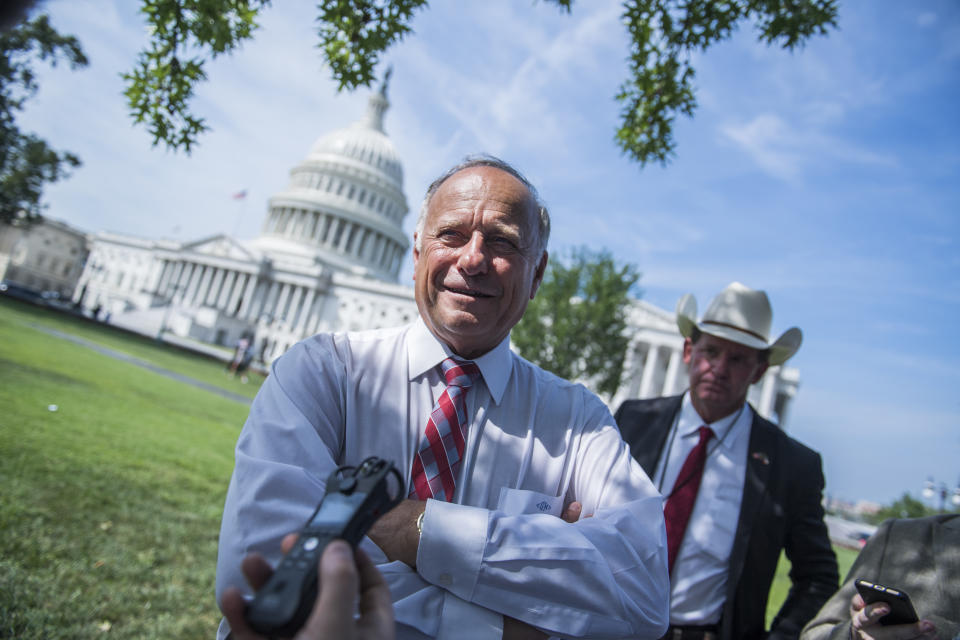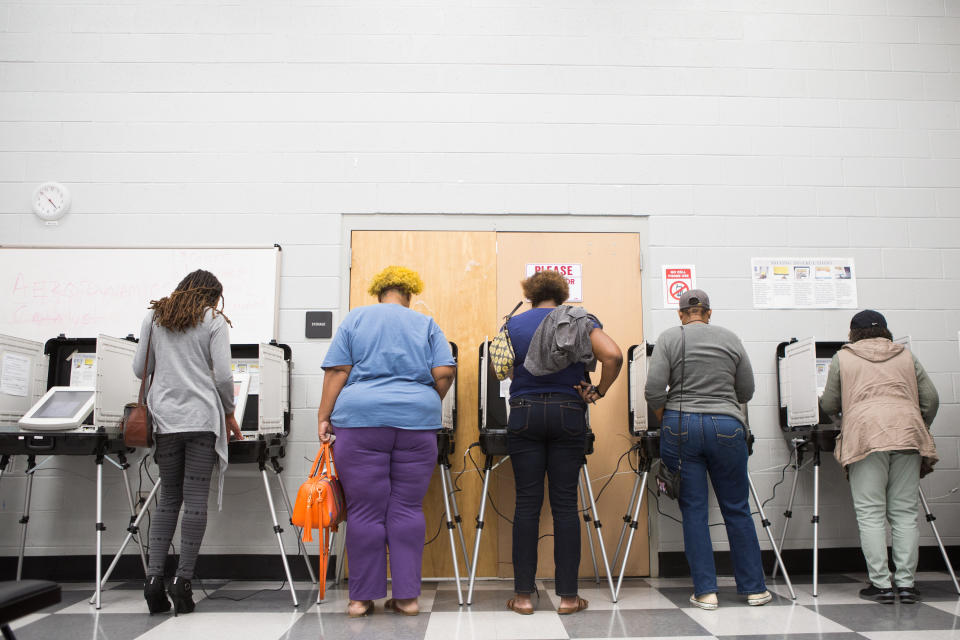On eve of midterms, polls give Democrats edge on generic ballots
The 2018 midterm elections are less than a day away. And if the final round of major national polls is to be believed, Democrats are poised to win control of the House of Representatives, while Republicans are set to maintain control of the Senate.
On so-called generic ballot polling, almost every survey shows likely voters support Democratic candidates over Republicans by an average margin of about 7.5 points. Just one of 13 major generic polls conducted in the lead-up to Election Day (Rasmussen Reports) gave Republicans an edge over Democrats, 46 percent to 45 percent — an advantage within the survey’s 2 percentage point margin of error. A CNN survey released Monday showed Democrats with a 13-point advantage over Republicans, an outlier that drew the ire of President Trump. But even a survey conducted by Trump’s favorite cable media outlet, Fox News, staked Democratic candidates to a 7-point lead over their GOP counterparts.
Generic ballots
• CNN: Democrat 55 percent, Republican 42 percent
Margin of error: +/- 3 percentage points
Edge: Dem +13
• Politico/Morning Consult: Democrat 43, Republican 40
Margin of error: +/- 2 percentage points
Edge: Dem +3
• ABC News/Washington Post: Democrat 52, Republican 44
Margin of error: +/- 3 percentage points
Edge: Dem +8
• NBC News/Wall Street Journal: Democrat 50 percent, Republican 43 percent
Margin of error: +/- 3 percentage points
Edge: Dem +7
• Investor’s Business Daily: Democrat 50 percent, Republican 41 percent
Margin of error: +/- 3 percentage points
Edge: Dem +9
• Reuters/Ipsos: Democrat 49 percent, Republican 42 percent
Margin of error: +/- 2 percentage points
Edge: Dem +7
• Fox News: Democrat 49 percent, Republican 42 percent
Margin of error: +/- 3 percentage points
Edge: Dem +7
• USA Today/Suffolk University: Democrat 51 percent, Republican 43 percent
Margin of error: +/- 3 percentage points
Edge: Dem +8
• Rasmussen Reports: Republican 46 percent, Democrat 45 percent
Margin of error: +/- 2 percentage points
Edge: Rep +1
• The Economist/YouGov: Democrat 47 percent, Republican 42 percentage points
Margin of error: +/- 3 percentage points
Edge: Dem +5
• NPR/PBS NewsHour/Marist: Democrat 52 percent, Republican 43 percent
Margin of error: +/- 4 percentage points
Edge: Dem +9
• Harvard-Harris Poll: Democrat 47 percent, Republican 38 percent
Margin of error: +/- 4 percentage points
Edge: Dem +9
• USC Dornsife/Los Angeles Times: Democrat 56 percent, Republican 41 percent
Margin of error: +/- 2 percentage points
Edge: Dem +15

Key races: Senate
Of the 35 Senate seats up for grabs on Tuesday, three high-profile races are seen as key to Republican hopes of maintaining their control of the chamber, perhaps none more so than in Texas, where incumbent GOP Sen. Ted Cruz is in a dogfight with Democratic wunderkind Beto O’Rourke. Polls show Cruz with a single-digit lead that is at or just outside the margins of error.
In Florida, the incumbent Democratic Sen. Bill Nelson is embroiled in a battle for reelection with Republican Gov. Rick Scott. Some polls show Nelson with a slight edge, others have Scott grabbing Nelson’s seat. A CBS News/YouGov survey has the pair knotted in a statistical tie.
And in Arizona, Democrat Kyrsten Sinema has a razor-thin lead over Republican Martha McSally.
Texas
• Emerson College: Ted Cruz (R) 50 percent, Beto O’Rourke (D) 47 percent
Margin of error: +/- 4 percentage points
Edge: Cruz +3
• Texas Tribune/University of Texas: Ted Cruz (R) 51 percent, Beto O’Rourke (D) 45 percent
Margin of error: +/- 3 percentage points
Edge: Cruz +6
• Quinnipiac University: Ted Cruz (R) 51 percent, Beto O’Rourke (D) 46 percent
Margin of error: +/- 4 percentage points
Edge: Cruz +5
• New York Times/Siena: Ted Cruz (R) 51 percent, Beto O’Rourke (D) 43 percent
Margin of error: +/- 2 percentage points
Edge: Cruz +8
Florida
• Quinnipiac University: Bill Nelson (D) 51 percent, Rick Scott (R) 44 percent
Margin of error: +/- 4 percentage points
Edge: Nelson +7
• St. Pete Polls: Rick Scott (R) 49 percent, Bill Nelson (D) 48 percent
Margin of error: +/- 2 percentage points
Edge: Scott +1
• CBS News/YouGov: Bill Nelson (D) 46 percent, Rick Scott (R) 46 percent
Margin of error: +/- 4 percentage points
Edge: None
Arizona
• CNN: Kyrsten Sinema (D) 51 percent, Martha McSally (R) 47 percent
Margin of error: +/- 4 percentage points
Edge: Sinema +4
• Fox News: Kyrsten Sinema (D) 46 percent, Martha McSally (R) 46 percent
Margin of error: +/- 4 percentage points
Edge: None
• NBC News/Marist: Kyrsten Sinema (D) 50 percent, Martha McSally (R) 44 percent
Margin of error: +/- 5 percentage points
Edge: Sinema +6

Key races: House
All 435 House seats are technically up for grabs on Tuesday, though several candidates — like Democrat Ayanna Pressley in Massachusetts — are running uncontested and are virtually guaranteed victories. But many races are tossups, including some in districts that weren’t expected to be close. In Iowa, Republican incumbent Steve King is in a surprisingly tight race against Democratic challenger J.D. Scholten. King’s comfortable lead has evaporated amid accusations of racist rhetoric and ties to far right extremists leveled against him by both Democrats and leaders of his own party. And polls in Kentucky and Virginia show Republicans and Democrats tied in two bellwether House races.
Iowa’s Fourth Congressional District
• New York Times/Siena College: Steve King (R) 47 percent, J.D. Scholten (D) 42 percent
Margin of error: +/- 5 percentage points
Edge: King +5
• Emerson College: Steve King (R) 51 percent, J.D. Scholten (D) 42 percent
Margin of error: +/- 6 percentage points
Edge: King +9
Kentucky’s Sixth Congressional District
• New York Times/Siena College: Andy Barr (R) 44 percent, Amy McGrath (D) 44 percent
Margin of error: +/- 5 percentage points
Edge: None
Virginia’s Seventh Congressional District
• New York Times/Siena College: Dave Brat (R) 46 percent, Abigail Spanberger (D) 44 percentage points
Margin of error: +/- 5 percentage points
Edge: Brat +2
• Christopher Newport University: Abigail Spanberger (D) 46 percent, David Brat (R) 45 percent
Margin of error: +/- 4 percentage points
Edge: Spanberger +1
• Monmouth University: David Brat (R) 47 percent, Abigail Spanberger (D) 47 percent
Margin of error: +/- 4 percentage points
Edge: None

Key governor’s races
Outside of the House and Senate, there are several hotly contested governor’s races to keep an eye on, especially in Georgia, where Democrat Stacey Abrams is vying to become the first African-American female governor in U.S. history. The race has drawn national attention, thanks in part to Oprah Winfrey and former President Barack Obama, who campaigned for Abrams over the weekend. Recent polls put the distance between Abrams and Republican Brian Kemp well within the margins of error, and both are polling below 50 percent. (If neither candidate reaches the 50 percent threshold, Georgia will hold a runoff on Dec. 6.)
The race for Florida governor has struck a similar chord nationally, with Tallahassee Mayor Andrew Gillum, like Abrams, fending off personal attacks from Trump. According to recent polls, Gillum appears to have a slight lead heading into Tuesday. And in Wisconsin, incumbent Gov. Scott Walker is facing a stiff challenge from Democratic Tony Evers. The most recent Marquette University survey has Walker and Evers in a virtual tie.
Georgia
• NBC News/Marist: Brian Kemp (R) 49 percent, Stacey Abrams (D) 47 percent
Margin of error: +/- 5 percentage points
Edge: Kemp +2
• The Atlanta Journal-Constitution: Stacey Abrams (D) 47 percent, Brian Kemp (R) 47 percent
Margin of error: +/- 3 percentage points
Edge: None
• Emerson College: Brian Kemp (R) 49 percent, Stacey Abrams (D) 47 percent
Margin of error: +/- 4 percentage points
Edge: Kemp +2
Florida
• Quinnipiac University: Andrew Gillum (D) 50 percent, Ron DeSantis (R) 43 percent
Margin of error: +/- 4 percentage points
Edge: Gillum +7
• St. Pete Polls: Andrew Gillum (D) 48 percent, Ron DeSantis (R) 46 percent
Margin of error: +/- 2 percentage points
Edge: Gillum +2
• NBC News/Marist: Andrew Gillum (D) 48 percent, Ron DeSantis (R) 43 percent
Margin of error: +/- 5 percentage points
Edge: Gillum +5
Wisconsin
• Marquette Law School: Scott Walker (R) 47 percent, Tony Evers (D) 47 percent
Margin of error: +/- 3 percentage points
Edge: None
• NBC News/Marist: Tony Evers (D) 50 percent, Scott Walker (R) 42 percent
Margin of error: +/- 5 percentage points
Edge: Evers +8
All of these polls, of course, should be taken with a grain of salt. While they were technically within their margins of error, most national surveys conducted on the eve of the 2016 presidential elections showed Hillary Clinton with a narrow lead over Trump. Clinton wound up winning the popular vote, finishing with 65,844,610 (48.2 percent) compared with Trump’s 62,979,636 (46.1 percent). But Trump finished with 306 electoral votes to Clinton’s 232 to capture the presidency.
_____
Read more from Yahoo News:




